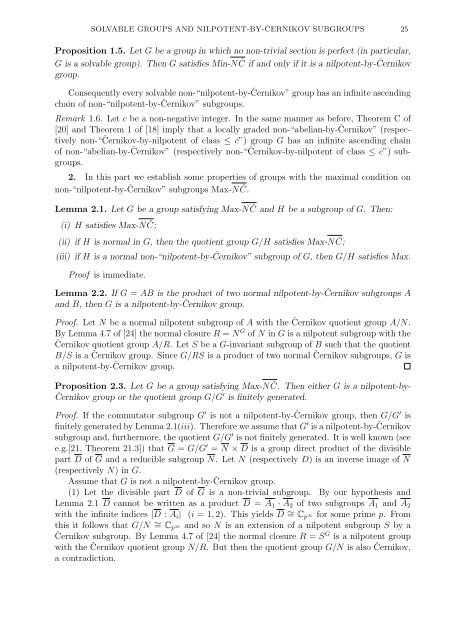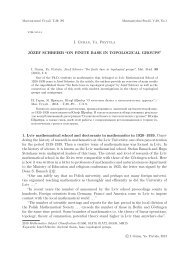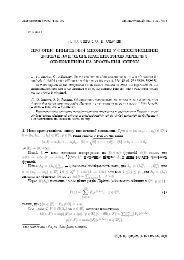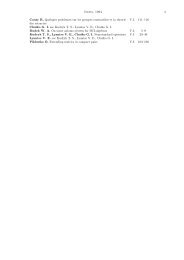SOLVABLE GROUPS WITH MANY CONDITIONS ON NILPOTENT ...
SOLVABLE GROUPS WITH MANY CONDITIONS ON NILPOTENT ...
SOLVABLE GROUPS WITH MANY CONDITIONS ON NILPOTENT ...
Create successful ePaper yourself
Turn your PDF publications into a flip-book with our unique Google optimized e-Paper software.
<strong>SOLVABLE</strong> <strong>GROUPS</strong> AND <strong>NILPOTENT</strong>-BY-ČERNIKOV SUB<strong>GROUPS</strong> 25<br />
Proposition 1.5. Let G be a group in which no non-trivial section is perfect (in particular,<br />
G is a solvable group). Then G satisfies Min-NČ if and only if it is a nilpotent-by-Černikov<br />
group.<br />
Consequently every solvable non-“nilpotent-by-Černikov” group has an infinite ascending<br />
chain of non-“nilpotent-by-Černikov” subgroups.<br />
Remark 1.6. Let c be a non-negative integer. In the same manner as before, Theorem C of<br />
[20] and Theorem 1 of [18] imply that a locally graded non-“abelian-by-Černikov” (respectively<br />
non-“Černikov-by-nilpotent of class ≤ c”) group G has an infinite ascending chain<br />
of non-“abelian-by-Černikov” (respectively non-“Černikov-by-nilpotent of class ≤ c”) subgroups.<br />
2. In this part we establish some properties of groups with the maximal condition on<br />
non-“nilpotent-by-Černikov” subgroups Max-NČ.<br />
Lemma 2.1. Let G be a group satisfying Max-NČ<br />
(i) H satisfies Max-NČ;<br />
and H be a subgroup of G. Then:<br />
(ii) if H is normal in G, then the quotient group G/H satisfies Max-NČ;<br />
(iii) if H is a normal non-“nilpotent-by-Černikov” subgroup of G, then G/H satisfies Max.<br />
Proof is immediate.<br />
Lemma 2.2. If G = AB is the product of two normal<br />
and B, then G is a nilpotent-by-Černikov group.<br />
nilpotent-by-Černikov subgroups A<br />
Proof. Let N be a normal nilpotent subgroup of A with the Černikov quotient group A/N.<br />
By Lemma 4.7 of [24] the normal closure R = N G of N in G is a nilpotent subgroup with the<br />
Černikov quotient group A/R. Let S be a G-invariant subgroup of B such that the quotient<br />
B/S is a Černikov group. Since G/RS is a product of two normal Černikov subgroups, G is<br />
a nilpotent-by-Černikov group.<br />
Proposition 2.3. Let G be a group satisfying Max-NČ. Then either G is a nilpotent-by-<br />
Černikov group or the quotient group G/G ′ is finitely generated.<br />
Proof. If the commutator subgroup G ′ is not a nilpotent-by-Černikov group, then G/G′ is<br />
finitely generated by Lemma 2.1(iii). Therefore we assume that G ′ is a nilpotent-by-Černikov<br />
subgroup and, furthermore, the quotient G/G ′ is not finitely generated. It is well known (see<br />
e.g.[21, Theorem 21.3]) that G = G/G ′ = N × D is a group direct product of the divisible<br />
part D of G and a reducible subgroup N. Let N (respectively D) is an inverse image of N<br />
(respectively N) in G.<br />
Assume that G is not a nilpotent-by-Černikov group.<br />
(1) Let the divisible part D of G is a non-trivial subgroup. By our hypothesis and<br />
Lemma 2.1 D cannot be written as a product D = A 1 · A 2 of two subgroups A 1 and A 2<br />
with the infinite indices |D : A i | (i = 1, 2). This yields D ∼ = C p ∞ for some prime p. From<br />
this it follows that G/N ∼ = C p ∞ and so N is an extension of a nilpotent subgroup S by a<br />
Černikov subgroup. By Lemma 4.7 of [24] the normal closure R = S G is a nilpotent group<br />
with the Černikov quotient group N/R. But then the quotient group G/N is also Černikov,<br />
a contradiction.









